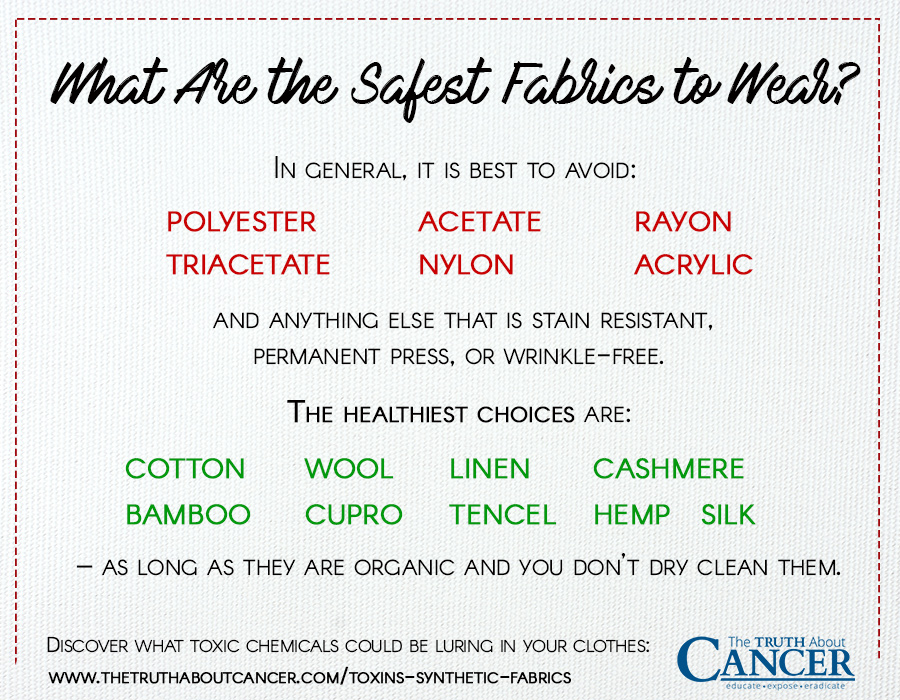We strive to be healthy. We eat our vegetables; we drink our green juices and smoothies. Then we head to the gym. Uh-oh. While daily moderate exercise contributes to good health and has been found to lower the risk of cancer recurrence by up to 50%, did you know that your favorite workout clothes could be making you and everyone else sick?
Research shows that hazardous chemicals such as phthalates, perfluorinated chemicals (PFCs), dimethylformamide (DMF), nonylphenol ethoxylates (NPEs), and nonylphenols (NPs) are found in most sportswear. One Swedish study found that these substances, known endocrine disruptors, are just not good for you. Countless other studies say the same, including those done at NYU Langone.
After all, women with hormone-driven cancers really don’t need exposure to more chemicals that interfere with their hormone systems. Plus, many of these chemicals have direct links to cancer.
Men Are at Risk From Synthetic Fabrics Too
PFCs have been linked to prostate cancer, and DMF has been linked to testicular and other cancers as well as to severe damage to the liver (a healthy liver is essential for efficient detoxification). What this means is that men should also not be wearing their synthetic pants any longer than necessary.
Synthetic clothing also contains other toxic chemicals such as formaldehyde and perfluorinated chemicals (Teflon), which are used to make clothes wrinkle-free and cling-free (after all, we need to look good in our clothes, right?).
Formaldehyde, a known carcinogen, has been linked to a significant increase in lung cancer risk. One study linked formaldehyde to a dramatic increase in myeloid leukemia incidence. Teflon, another carcinogen, has been linked to various cancers and health issues. Suffice it to say that synthetic fabrics are too toxic to wear every day, all day long, and should be worn with caution.
While toxic chemicals are an issue with most clothing, sportswear presents an added problem as sweat and friction can precipitate more rapid absorption of toxins into the body. As the body heats up, the high temperature and humidity open up your pores and increase chemical absorption. When toxins are absorbed through the skin, they bypass the liver, which is responsible for metabolizing and removing toxins. Thus, these chemicals are free to cause havoc within the body.
Why Sports Bras Are of Particular Concern
I am particularly concerned with sports bras, as women who have had lymph node removal surgery may have an even more sluggish lymphatic system (the lymphatic system is notoriously sluggish). This is a problem because toxins then stagnate in the breast and lymph node areas.
Plus, NPEs and NPs – absorbable through the skin – have shown to have estrogenic properties in humans. Unfortunately, many of us stay in our yoga pants all day, even if we have swapped out our sweaty bra for a dry top. Instead, we should really shower right after exercising and change into natural fiber clothing.
Workout Clothes Provide Toxic Fish Food
A new study led by the Mississippi-Alabama Sea Grant Consortium, found that shreds of plastic are released from these fabrics during the wash cycle as well as down the shower drain. This is because exercise clothes – as well as those comfy, warm polar-fleece jackets – are made from synthetic materials, including recycled polyester from plastic soda bottles. When washed, they shed microscopic plastic fibers (microfibers) into water systems.
These fragments are not good for the environment, nor are they good for you. Importantly, they are too small to be filtered out. Once they enter the water, they end up in the stomachs of marine species, such as shellfish like oysters. So essentially, you could be eating your yoga pants for dinner!
What Are the Safest Fabrics to Wear?
In general, it is best to avoid polyester, acrylic, rayon, acetate, triacetate, nylon, and anything else that is stain resistant, permanent press, or wrinkle-free. The healthiest choices are organic cotton, wool, silk, linen, hemp, bamboo, Cupro, Tencel, and cashmere – as long as you don’t dry clean these fabrics.
Wash all new clothing in non-toxic detergent prior to use as even those made of organic fabrics may contain chemical processing detergents, bleaches, formaldehyde, chemical softeners, and more. Never use commercial fabric softeners or dryer sheets, which add a whole other layer of chemicals. Going forward, continue to use only non-toxic cleaning products.
Why We Need to Detoxify on a Regular Basis
All the collective chemicals that we eat, use, or wear pollute the body and our environment. However, as we cannot avoid every toxin we come across, daily detoxification is essential.
Detoxification is the process of actively eliminating toxins in the body. Specifically, the liver has the task of keeping the blood clean and neutralizing toxic substances, including excess estrogen. It processes toxins and excretes them from the body.
In the perfect world, your body would expel toxins on a daily basis. But the world is not perfect, and over time toxins build up in the body, including within the lymphatic system. Too many toxins can overwhelm this system and lead to liver damage and various chronic diseases, including cancer. Foods such as cruciferous vegetables, consumed on a regular basis, can support the detoxification process. Certain supplements are also highly beneficial.
Are you surprised to hear about toxins in synthetic fabrics? Please share this important information with your friends and family.
Article Summary
Did you know that your favorite workout clothes could be making you sick and harming the environment?
Hazardous chemicals such as phthalates, perfluorinated chemicals (PFCs), dimethylformamide (DMF), nonylphenol ethoxylates (NPEs), and nonylphenols (NPs) are found in most sportswear.
These substances, which are known endocrine disruptors are especially problematic for people with hormone-driven cancers such as breast and prostate cancer.
It is best to avoid polyester, acrylic, rayon, acetate, triacetate, nylon, and anything else that is stain resistant, permanent press, or wrinkle-free.
All the collective chemicals that we eat, use, or wear pollute the body and our environment. However, as we cannot avoid every toxin we come across, daily detoxification is essential.
Foods such as cruciferous vegetables, consumed on a regular basis, can support the detoxification process. Certain supplements are also highly beneficial.




















Thanks for the article. I will say though that this isn’t as dangerous as chemicals in food and water, but it is something we should be aware of.
Also the chemicals used to clean gym equipment are toxic.
A question I need a great deal of help with from someone knowledgeable in the field of detoxification. How does one detox when highly sensitive to histamine (fermented foods), salicylates and sulfur (thiol producing)? Right now I am living on carrots and meats due to these sensitivities and SIBO. I am at my wits end. I am almost 70 and have not eaten the SAD diet for almost 40 years. I have MCS and have also wear masks and use environmentally safe products. I should have none of this stuff and should be as healthy as they come. Can anyone direct me to the right doctor, someone who understands this wacky body I am being asked to occupy? Thank you.
You may be sensitive to all these things because of vaccinations/injections in the right arm. Find someone who is knowledgeable in this field and you may be released from all of these symptoms. If I was in America I could help you, but unfortunately I am on the other side of the world. Best of luck to you.
Neil.
You may consider trying coffee enemas to detoxify if you haven’t already.
Please look up dr. Jess md. She is on social media and is amazing with detox and hidden pathogens! She can help you.
I watched some of Jonathan Otto’s episodes on Depression and Anxiety, because some members of my family have those. Also when I read that it all starts in the gut, I wanted to know what they about it. In one episode, SIBO was mentioned and the author talked about the 3 day fast and it seems that it is the only way to get rid of it. Although I had just lost weight and was struggling, having difficulty to find foods that did not bother me, I did the fast. It was not as difficult as I thought it would be. I used broth to prevent demineralization. I have been able to reintroduced some foods that I have not eaten before. I sleep better. I also follow different advice for my diet. I like Phyllis A. Balch CNC “Rx Prescription for Cooking & Dietary Wellness.” I would also recommend dadamo.com website and his books about the “”blood type diet” which I try to follow, although there are still foods I cannot eat as I am gluten and lactose intolerant, but it all helps. I also have a “hair tissue mineral analysis” HTMA every year. I am on my 15th year. It is analyzed in one of Dr. David L. Watts, DC PhD, FACEP labs. I get back a report with guidance about my diet as well. Check nutritionalbalancinh.org. I go through my local store in IA for this. They send my hair and give me my report. I hope and pray that this will help you. Prayer is helpful as God is ultimately the Great Healer.
I’m interested in the HTMA.
It cost $150 here in my area.
Is that about what you pay?
Maybe check out Viome.com. They provide gut testing and will tell you what kinds of microbes, viruses, parasites you have as well as food sensitivities and foods you should eat based on your biology. I just signed up last night – it’s $149.
See Dr keesha ewers. She helped me with all those things. Your situation sounds a lot like mine
Have you checked out the Dynamic Neural Retraining System (DNRS)? I have all those things too and this program has helped me a lot! It’s about healing your injured limbic system and rewiring your brain. It really helps with my MCS triggers. I’m sorry for your suffering and pray you can find a way of healing.
Where do you get the natural fabrics? I can’t seem to find any.
I have found organic clothing on Amazon and here are some companies thegoodtrade.com, indigenous.com,
bluecanoe.com.
I only wear natural fabrics and yes they are getting harder to find. There are some companies which are mail order only that have some still. One of the best is Garnet Hill. Another is Poetry. They only have natural fibers. Eileen Fisher still has some natural fiber only clothes, but less than previously. Lands End and LL Bean still have some and The Peruvian Connection has some, but they too have started making some things mixed with synthetics. Three Dots has cotton Tshirts. The Company Store sells mostly bedding and towels in natural fibers, and some natural fiber clothing. The Pure Collection is all natural fibers. Ann Taylor has some all natural Tshirts, but all the cotton pants have spandex mixed in.
I have told companies like LLBean and Eileen Fisher and Peruvian Connection that I will not buy anything with synthetics.
I used to make my own clothes and one of the reasons was not wearing synthetics.
I have purchased bamboo fabrics on eBay, where it is reasonable and readily available. I LOVE it!
10 Tree clothing can be purchased online. It is a great Canadian company and for every purchase, they plant 10 trees! Their fabrics are made from organic Cotten, hemp and tencel. Their clothing is mostly casual.
Pact out of the US sells basics as well, along with under garments and pjs.
Why is Rayon bad, but Tencel (a brand name for Lenzing Fibres rayon) good?
I always use cotton yoga pants but they have 5% spandex. I don’t like having the spandex but have been unable to find 100% cotton in workout pants. I often wonder how bad it is to have this 5% synthetic fabric in my workout clothing..
Rayon is a man made fiber using cellulose. The cellulose can be trees or bamboo. Could it be made from cellulose created with bacteria as Hardy Siding is done?